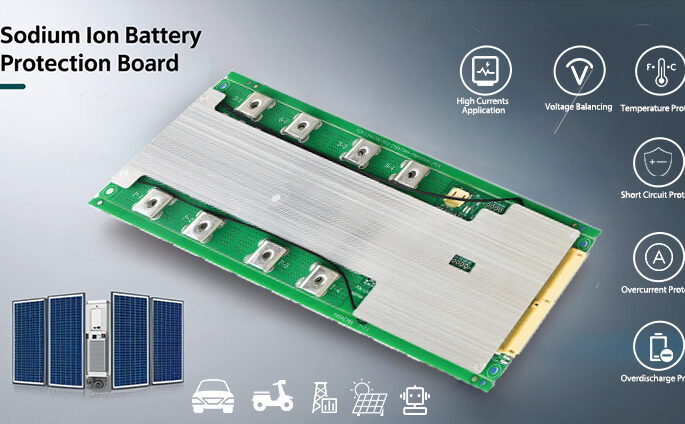Sodium-ion batteries are emerging as a promising alternative in the world of energy storage, particularly due to their cost-effectiveness and abundant raw material supply. However, like any battery technology, they require sophisticated management systems to ensure safety, longevity, and optimal performance. This is where the ”Sodium Ion Battery BMS (Battery Management System)“ plays a critical role.
Sodium Ion Battery: An Overview
Sodium-ion batteries are engineered to handle high working currents, up to 200A, and come equipped with advanced features such as an electronic switch, voltage balancing, and temperature protection functions during charging. These functions are vital for maintaining battery health and ensuring consistent performance over time.
In environments with an ambient temperature of 30°C, these batteries can discharge continuously at 200A for over an hour while keeping the MOS (Metal-Oxide-Semiconductor) temperature below 110°C. This capability highlights the robust design of sodium-ion batteries, making them suitable for a wide range of applications.
The Role of Sodium Ion Battery BMS
A”Sodium Ion Battery BMS” is essential for monitoring and managing the various functions of the battery, ensuring that it operates within safe parameters. The BMS provides multiple layers of protection, including:
-1. Overcharge Protection: Prevents the battery from exceeding its maximum voltage, which could lead to overheating or even explosions.
-2. Overdischarge Protection: Protects the battery from discharging below its minimum voltage, which could otherwise result in permanent damage.
-3. Overcurrent Protection: Monitors the current to prevent excessive currents that could damage the battery or connected devices.
-4. Short Circuit Protection: Instantly disconnects the battery in the event of a short circuit, avoiding potential fire hazards.
-5. Temperature Protection: Monitors the battery’s temperature to avoid overheating, which is critical for safety, especially in high-current applications.
Applications of Sodium Ion Battery BMS
The “Sodium Ion Battery BMS” is widely used across various industries, owing to its ability to handle high currents and provide extensive protection. Some of the key applications include:
– New Energy Vehicles: In electric and hybrid vehicles, the BMS ensures safe power management, enhancing vehicle performance and battery longevity.
– Golf Carts and Electric Motorcycles: The BMS provides reliable power delivery and protection for smaller electric vehicles, ensuring smooth and safe operation.
– Communication Energy Storage: The BMS supports the energy needs of telecom infrastructure, ensuring uninterrupted service.
– Solar Energy Storage: Optimizing the storage and use of solar-generated electricity.
– Medical Equipment: Ensures that critical medical devices remain operational and safe, even in demanding conditions.
– Intelligent Robots and AGVs (Automated Guided Vehicles): The BMS guarantees uninterrupted operation in automated systems, critical for industrial and commercial automation.
– Lead-Acid Battery Replacement: Offering a safer and more efficient alternative to traditional lead-acid batteries.
The Sodium Ion Battery BMS is an integral component in ensuring the safety and efficiency of sodium ion batteries across various applications. With features like overcharge, overdischarge, overcurrent, short circuit, and temperature protection, it not only safeguards the battery but also enhances its performance and longevity. As sodium ion technology continues to evolve, the role of advanced BMS systems will be crucial in unlocking its full potential, particularly in new energy vehicles, energy storage solutions, and other critical applications.

